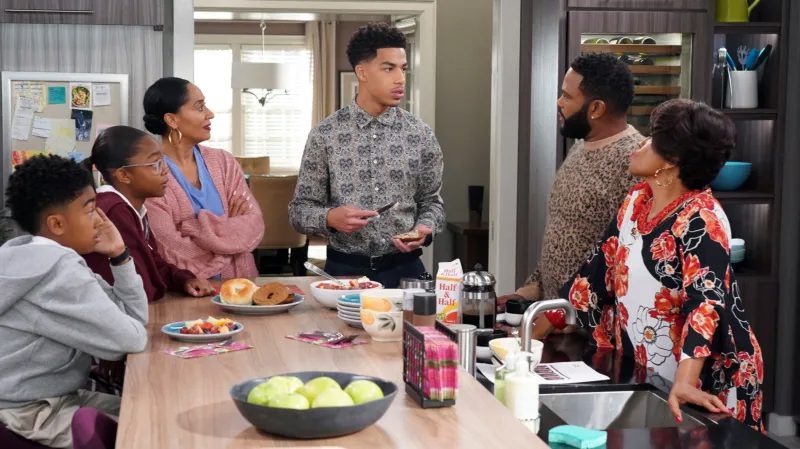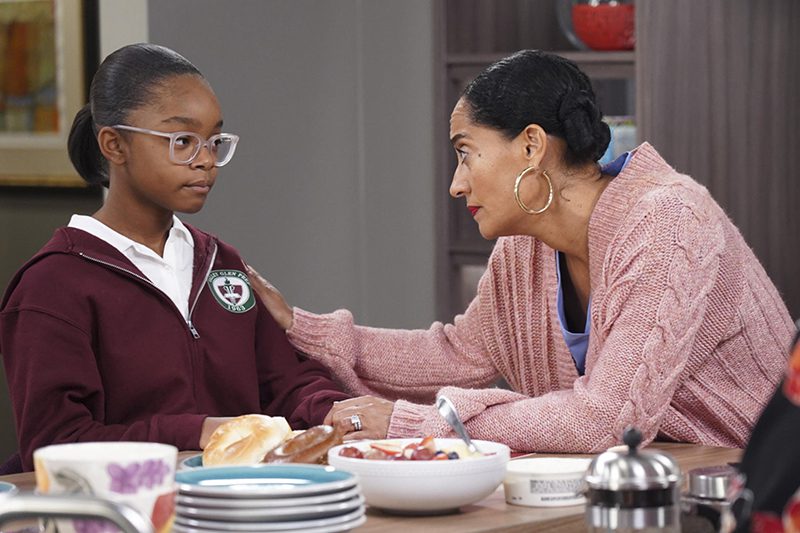How ‘Black-Ish’ Confronts The Issue Of Colorism In ‘Black Like Us’

Through a careful blend of humor and education, Kenya Barris’s sitcom Black-ish has been praised for stirring up important conversations within the African-American community. Now in its fifth season, the series opened up about colorism in the latest episode, “Black Like Us ”– and viewers can’t stop talking about it.
Written by Peter Saji, “Black Like Us” began as it typically does for the Johnson family. As Dre and Bow prepare breakfast on a weekday morning, they are shocked to find that Diane was not properly lit in her class photo. This prompts one of Dre’s teaching moments, where he dives into the history of colorism for viewers at home. He points out how TIME magazine edited OJ Simpson’s complexion to appear darker in order to make him seem more “villainous,” and educated viewers on the Brown Paper Bag Test, where African-Americans would even discriminate against their own kind (and still do) if one’s shade was darker than that of a paper bag. Dre informs us how colorism is still very prevalent outside of the Black population, particularly in Asian, Indian, and Latino communities. Hence, it is a topic that needs to be addressed globally, and Black-ish writers are using their platform to initiate a discussion, despite how uncomfortable it may be.
After a heated call with the school’s principal, Bow and Dre discuss how to appropriately handle this sensitive topic, each parent having an opposite approach. And when Junior points out the Johnson family’s own issues with complexion, this opened the door for a serious conversation that is both tense and necessary.
Based on his perceived negative treatment as a light-skinned person within the family, Junior accuses them of being colorists, especially Dre. “Sometimes the light-skinned people in this family get treated badly,” said Junior, which sparks a stormy debate between Ruby and Bow about light-skinned privilege. Ruby, who compares the struggles of light-skinned persons to those of rich people, argues that only people with darker complexions have problems in this society. And while she makes valid points about Hollywood’s favoritism towards people of color with lighter skin tones, in recent years, there has been far more diversity in Hollywood than ever before – though there is still immense work to be done.
“I did not choose to be born with fairer skin,” Bow expresses, which is the exact reason why racism, colorism, and discrimination should cease to exist. Since we did not choose to be a particular race or shade, it is absurd to judge, belittle, or express favoritism over a physical quality that does not define us as human beings. Through conversations that start at home, we can break these toxic cycles of judgment based on skin complexion.
In one of the more heartbreaking moments of the episode, Diane speaks up about what it is like to live in her skin. “No one in this family is as dark as me,” she states firmly. She questions why her family is so afraid to discuss skin tone, and asks why people bleach their skin if all shades of Black are as beautiful as Bow claims. Diane then provides everyday examples of what it feels like as a dark-skinned woman, such as how she is ignorantly referred to as “gorgeous for a dark-skinned girl.”

Later, Ruby revealed her traumatic past, which admittedly has caused her own biases against light-skinned people today. Her fair skinned family was ashamed of Ruby’s darker skin, and shunned her for it as a child. “I had to play by myself in the back so my dark skin and my nappy hair couldn’t embarrass my light skinned family,” she said tearfully.
In the end, the Johnson family was able to openly acknowledge their own faults and grow from their previous insensitivities about colorism, which serves as an important lesson for us all. While Peter Saji and the co-showrunner Kenny Smith successfully opened up the door to discussing colorism, they confessed to The Root that it was difficult to tackle such a heavy and layered topic in the limited amount of time given.
“Our own personal conversations about colorism came up,” Smith said, recalling the experience in the writer’s room. “People talked about how it hurt them or made them feel stronger as a Black person. What we want is for the whole community—and people who aren’t in the community, such as [non-Black] Latinos and Asians—to start having these conversations with themselves and the community [through] seeing themselves in this episode.”
Black-ish airs every Tuesday at 9 p.m. ET on ABC, and stars Andre Johnson, Tracee Ellis Ross, Marsai Martin, Jenifer Lewis, Marcus Scribner, and Miles Brown. Watch a clip from the poignant episode below:
No Comments